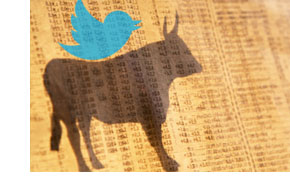 Twitter's recent IPO announcement
is the latest in a number of high profile public offerings from social
media giants. It follows the mega IPOs of Facebook and LinkedIn and also
comes in the wake of other socially connected companies' public
offerings, such as Zynga and Groupon.
Twitter's recent IPO announcement
is the latest in a number of high profile public offerings from social
media giants. It follows the mega IPOs of Facebook and LinkedIn and also
comes in the wake of other socially connected companies' public
offerings, such as Zynga and Groupon.It is an indication of just how important these platforms have become, not just to the web, but to the whole of society, that they are valued so highly and get such huge media attention. However, there is an argument to say that as they all cease to be independent, that we all start to miss out.
The filter bubble
In 2011 Eli Pariser wrote 'The filter bubble'. The book outlines his theory that the more we use the web, the less rich and varied our experience becomes. He argued that because of the way web software learns how you behave and what content you consume, that in fact, as you use it more you are less likely to encounter a contrarian view. That's because you are simply served content through search and social interactions that fit with a profile you create daily and increasingly polarises you.
This is particularly noticeable if you use Google as your primary search engine. Google's algorithm ensures you receive personalised results. On one hand this is great as you tend to get the stuff you want, but it also means increasingly you only see content you are likely to agree with and therefore are less likely to question certain 'truths'.
The Twitter bubble
With Twitter the bubble is slightly different. The way a user builds their Twitter profile shapes what content they see in their stream. The people you follow, the key words you use in your biography and the hashtags you follow, all help to shape the content you see, but also arguably, limit the content you are exposed to over time.
The Twitter IPO makes this phenomenon even more interesting. A lot of coverage in the past few weeks has focused around the fact that Twitter hasn't been profitable. Twitter are laying out plans for a whole host of commercial growth options, including greater integration with TV, increasing levels of tweet data mining, and of course more advertising.
Up until now it's been in Twitter's interest as a network to be as open as it possibly can be, but the commercial imperative that will be visited upon the company following its sale will inevitably force the platform into highly specific targeting around a whole number of commercial propositions. That will mean that the user's experience of it will inevitably become narrower and less eclectic leading to a further narrowing of experience.
Keeping the web open and democractic
It's worth noting that 20 years after the open, democratic web was born, it is possibly one of the most monopolised places you could visit. In all areas choices are narrowing. Consider the fact that increasingly there is one place to look for things (Google), one place to shop for new goods (Amazon), one place to sell things (Ebay), a couple of places to talk to your mates (Facebook and Twitter). That level of monopoly simply won't be good for business in the long term. It simply means there is increasing control over the channels to market and ultimately the price at which that channel can be sold. It's important that companies consider all available channels to ensure the web continues to be an open marketplace.
No comments:
Post a Comment